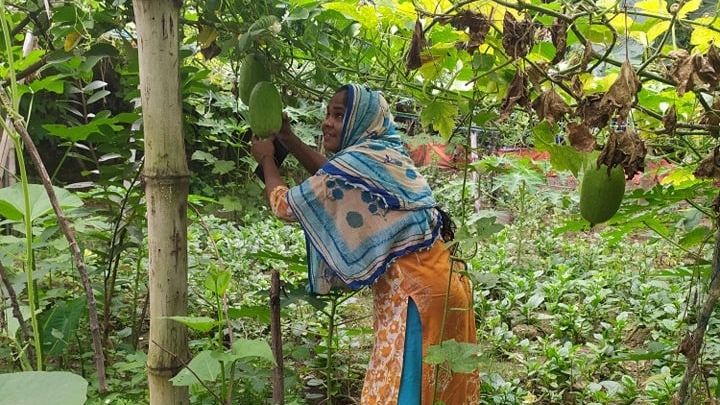
Support Urban Farmers & Residents in Korail, Dhaka
Donation protected
Situated in the capital city of Dhaka, Korail is the largest informal settlement in Bangladesh and is home to over 100,000 residents. Community Town Federation (CTF), a women-led community organization of city-wide informal settlement (‘slum’) dwellers, is raising funds to support women urban farmers and community members in Korail. These urban farmers and daily-wage earners fall among the millions of Bangladeshis who lost jobs and have no source of income due to COVID-19. Many of these women are coping with food insecurity by relying on their existing urban farming practices to feed and sustain themselves.
For years, Rina Begum, a former garments factory worker and mother of two children, has been running her family through back- and front yard vegetable farming (lau shaak, lal shaak, pui shaak, papaya etc.) and selling dairy products from the cow and goats she raised. She lost her cow last year, and this year her garden has been damaged due to heavy rain and flooding. As passengers dwindled in the ongoing pandemic, her husband lost his source of income as he couldn’t pay rent for the 3-wheeler CNG taxi. At present, Rina is taking loans to secure 2 meals a day (instead of the usual 3). But with no source of income, she is unable to buy farming supplies and is falling further into debt.
Momtaz, mother of two children, has been living in Korail for 17 years. Her family migrated from Bhola when they lost their ancestral land to rise in river water. She farms vegetables to feed her family. This monsoon’s rain has damaged her garden. Due to the economic hardship brought about by the pandemic and people leaving the settlement, her husband had to shut down his shop. Momtaz is now unable to continue farming without supplies and her family is struggling to pay for rent and food.
Korail is the largest informal settlement in Bangladesh, holding over 100,000 people. But Korail’s story is not uncommon. Across thousands of informal settlements in Bangladesh, families are in a similar situation without any safety net and government support. The promised stimulus hasn’t reached informal workers who are hardest hit by the pandemic. NGOs, too, are unable to tackle the deepening hunger, homelessness, and displacement that is unfolding in Bangladesh. In this scenario, CTF has mobilized its own members and organized mutual aid projects of resource sharing to help each other. And now they are reaching out with their call for mutual aid beyond borders.
Your contribution will go towards supporting one week of food supplies (rice, lentils, potatoes, onion, salt, and oil), hygiene items (mask and soap) and farming equipment and seeds for 200 households.
Budget Breakdown
Total Food + Hygiene package Cost: 162,000 BDT / 2000 USD
Total Farming Supplies Cost: 80,000 BDT / 1000 USD
Efadul Huq, urban planning researcher who worked in Korail, is co-organizing this fundraiser with community organizers (Tahmina Akter Tonni & Shahiduzzaman Shamol) of CTF.
 Photo: CTF members meeting, 2020
Photo: CTF members meeting, 2020
 Photo: A front yard garden plot of community resident
Photo: A front yard garden plot of community resident
 Photo: A lakeside garden plot of community residents
Photo: A lakeside garden plot of community residents
For years, Rina Begum, a former garments factory worker and mother of two children, has been running her family through back- and front yard vegetable farming (lau shaak, lal shaak, pui shaak, papaya etc.) and selling dairy products from the cow and goats she raised. She lost her cow last year, and this year her garden has been damaged due to heavy rain and flooding. As passengers dwindled in the ongoing pandemic, her husband lost his source of income as he couldn’t pay rent for the 3-wheeler CNG taxi. At present, Rina is taking loans to secure 2 meals a day (instead of the usual 3). But with no source of income, she is unable to buy farming supplies and is falling further into debt.
Momtaz, mother of two children, has been living in Korail for 17 years. Her family migrated from Bhola when they lost their ancestral land to rise in river water. She farms vegetables to feed her family. This monsoon’s rain has damaged her garden. Due to the economic hardship brought about by the pandemic and people leaving the settlement, her husband had to shut down his shop. Momtaz is now unable to continue farming without supplies and her family is struggling to pay for rent and food.
Korail is the largest informal settlement in Bangladesh, holding over 100,000 people. But Korail’s story is not uncommon. Across thousands of informal settlements in Bangladesh, families are in a similar situation without any safety net and government support. The promised stimulus hasn’t reached informal workers who are hardest hit by the pandemic. NGOs, too, are unable to tackle the deepening hunger, homelessness, and displacement that is unfolding in Bangladesh. In this scenario, CTF has mobilized its own members and organized mutual aid projects of resource sharing to help each other. And now they are reaching out with their call for mutual aid beyond borders.
Your contribution will go towards supporting one week of food supplies (rice, lentils, potatoes, onion, salt, and oil), hygiene items (mask and soap) and farming equipment and seeds for 200 households.
Budget Breakdown
Total Food + Hygiene package Cost: 162,000 BDT / 2000 USD
Total Farming Supplies Cost: 80,000 BDT / 1000 USD
Efadul Huq, urban planning researcher who worked in Korail, is co-organizing this fundraiser with community organizers (Tahmina Akter Tonni & Shahiduzzaman Shamol) of CTF.
 Photo: CTF members meeting, 2020
Photo: CTF members meeting, 2020  Photo: A front yard garden plot of community resident
Photo: A front yard garden plot of community resident Photo: A lakeside garden plot of community residents
Photo: A lakeside garden plot of community residentsOrganizer
Efadul Huq
Organizer
Salina, KS